Individual Reflection on Team Project: BMT7100 Entrepreneurship iMBA
VerifiedAdded on 2023/06/10
|6
|1588
|293
Report
AI Summary
This report is a reflective account of an individual's experience within a team project for an Entrepreneurship course (BMT7100). The author discusses their assigned role as a finisher, their responsibilities including analyzing organizational competency and ensuring grammatical accuracy, and their involvement in group meetings. The report further elaborates on group dynamics and the author's contributions to the study, particularly in analyzing competitive advantages. The reflection covers future aspirations to take on more significant roles, such as a team leader, and concludes with insights gained about personal strengths and weaknesses, highlighting the project's contribution to developing teamwork and communication skills. Desklib offers similar solved assignments and resources for students.
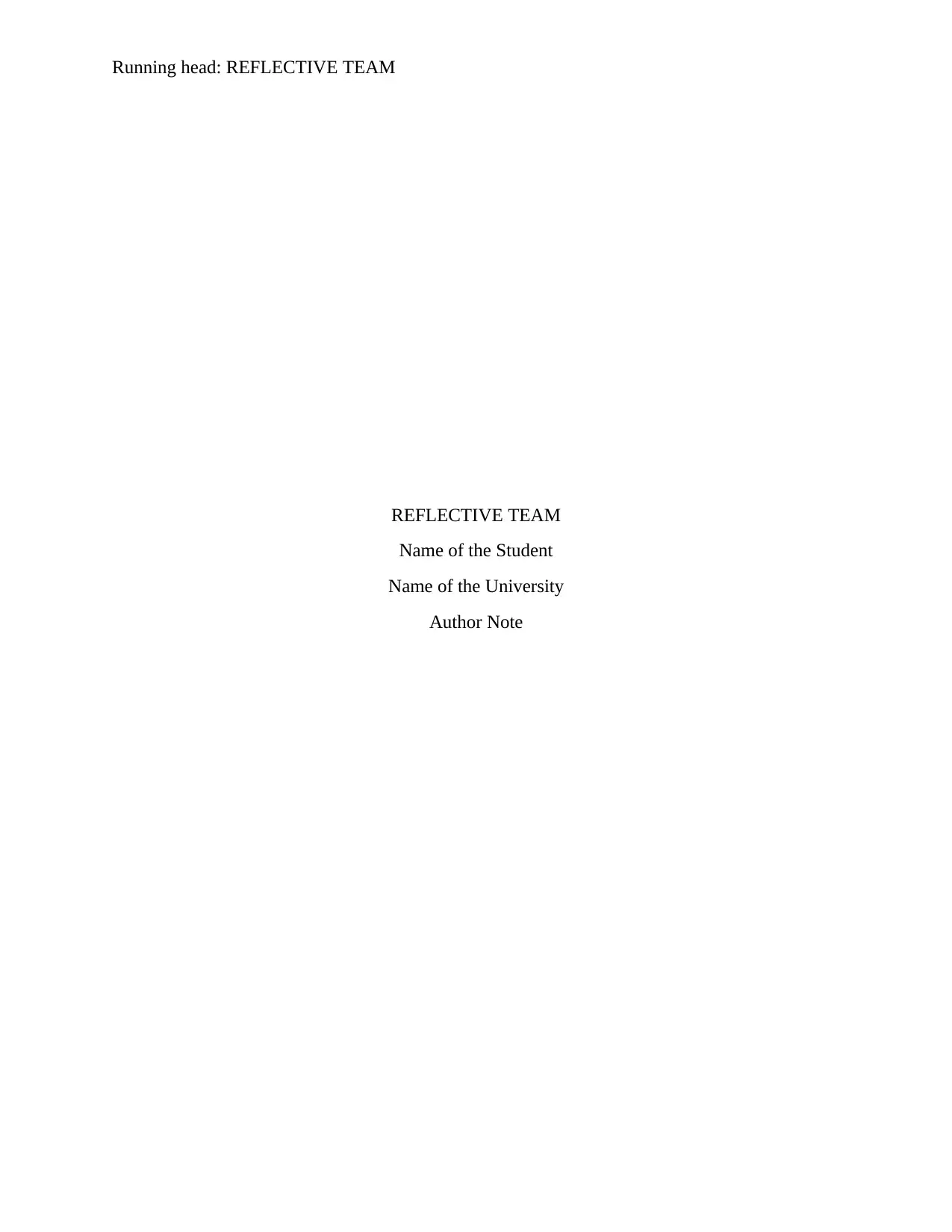
Running head: REFLECTIVE TEAM
REFLECTIVE TEAM
Name of the Student
Name of the University
Author Note
REFLECTIVE TEAM
Name of the Student
Name of the University
Author Note
Paraphrase This Document
Need a fresh take? Get an instant paraphrase of this document with our AI Paraphraser
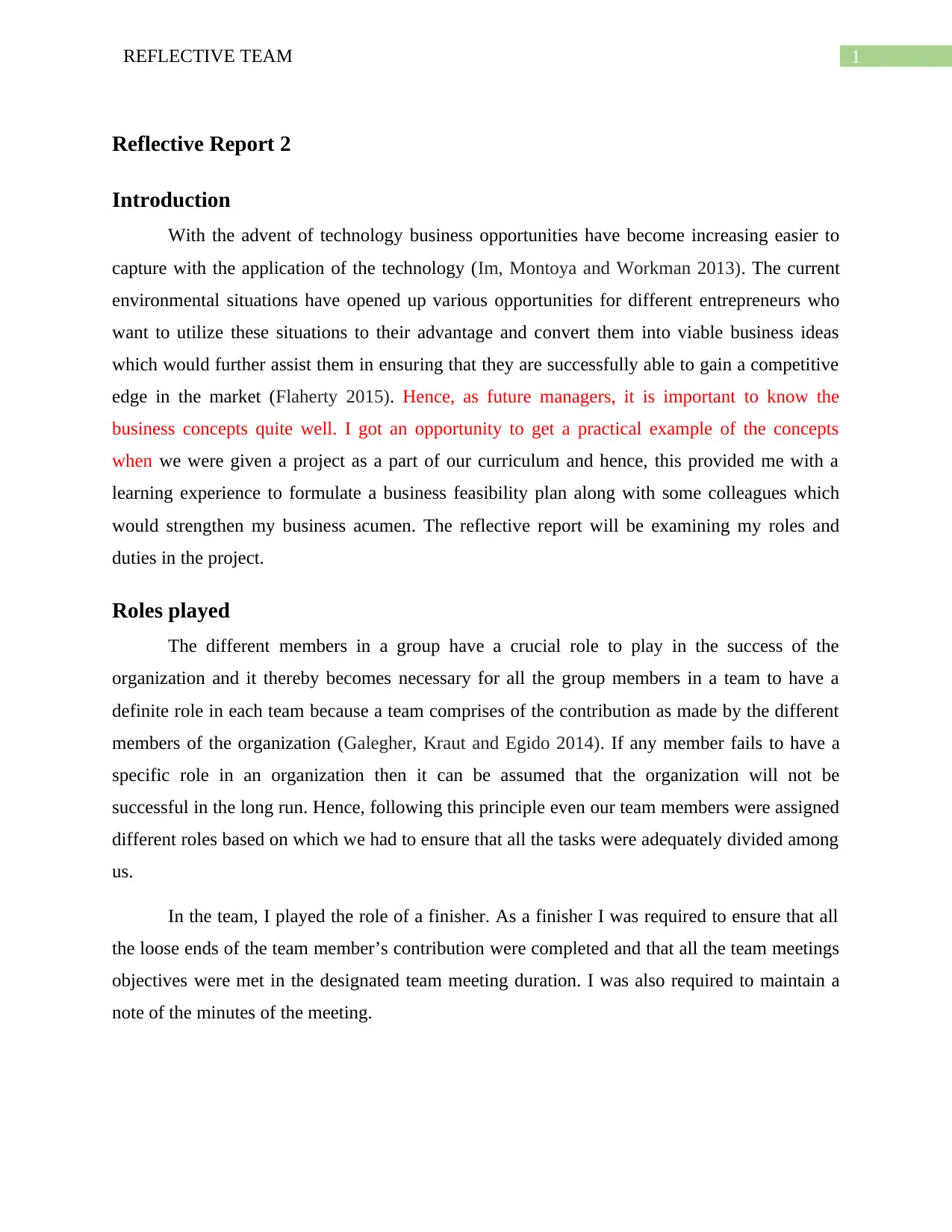
1REFLECTIVE TEAM
Reflective Report 2
Introduction
With the advent of technology business opportunities have become increasing easier to
capture with the application of the technology (Im, Montoya and Workman 2013). The current
environmental situations have opened up various opportunities for different entrepreneurs who
want to utilize these situations to their advantage and convert them into viable business ideas
which would further assist them in ensuring that they are successfully able to gain a competitive
edge in the market (Flaherty 2015). Hence, as future managers, it is important to know the
business concepts quite well. I got an opportunity to get a practical example of the concepts
when we were given a project as a part of our curriculum and hence, this provided me with a
learning experience to formulate a business feasibility plan along with some colleagues which
would strengthen my business acumen. The reflective report will be examining my roles and
duties in the project.
Roles played
The different members in a group have a crucial role to play in the success of the
organization and it thereby becomes necessary for all the group members in a team to have a
definite role in each team because a team comprises of the contribution as made by the different
members of the organization (Galegher, Kraut and Egido 2014). If any member fails to have a
specific role in an organization then it can be assumed that the organization will not be
successful in the long run. Hence, following this principle even our team members were assigned
different roles based on which we had to ensure that all the tasks were adequately divided among
us.
In the team, I played the role of a finisher. As a finisher I was required to ensure that all
the loose ends of the team member’s contribution were completed and that all the team meetings
objectives were met in the designated team meeting duration. I was also required to maintain a
note of the minutes of the meeting.
Reflective Report 2
Introduction
With the advent of technology business opportunities have become increasing easier to
capture with the application of the technology (Im, Montoya and Workman 2013). The current
environmental situations have opened up various opportunities for different entrepreneurs who
want to utilize these situations to their advantage and convert them into viable business ideas
which would further assist them in ensuring that they are successfully able to gain a competitive
edge in the market (Flaherty 2015). Hence, as future managers, it is important to know the
business concepts quite well. I got an opportunity to get a practical example of the concepts
when we were given a project as a part of our curriculum and hence, this provided me with a
learning experience to formulate a business feasibility plan along with some colleagues which
would strengthen my business acumen. The reflective report will be examining my roles and
duties in the project.
Roles played
The different members in a group have a crucial role to play in the success of the
organization and it thereby becomes necessary for all the group members in a team to have a
definite role in each team because a team comprises of the contribution as made by the different
members of the organization (Galegher, Kraut and Egido 2014). If any member fails to have a
specific role in an organization then it can be assumed that the organization will not be
successful in the long run. Hence, following this principle even our team members were assigned
different roles based on which we had to ensure that all the tasks were adequately divided among
us.
In the team, I played the role of a finisher. As a finisher I was required to ensure that all
the loose ends of the team member’s contribution were completed and that all the team meetings
objectives were met in the designated team meeting duration. I was also required to maintain a
note of the minutes of the meeting.

2REFLECTIVE TEAM
Group dynamics with respect to delivering the report
Although it is believed by many that group dynamics are relevant only in the cases of the
formal groups that tend to exist in an organization, but this is not true and in reality the group
dynamics exist in informal groups as well (Galegher, Kraut and Egido 2014). Group dynamics
deal with the manner in which the patterns are formed in a group and the way in which the group
gets comfortable with one another (Maxwell 2013). Our group dynamics grew stronger as we
started engaging in conversations and personal information. At the end of the project, it was due
to group dynamics that made us successful in the completion of the project.
Responsibilities for the report
The responsibilities held by me in the team have been given as follows:
The organizational competency and competitive advantage part: As the task had been
divided among different members of the group, we had divided the research as well as
assessment part. Hence, in the feasibility report part I was given the responsibility to analyze the
internal competencies and strengths of the organization, along with the competitive advantage as
possessed by the company. In doing so, I had to undertake a SWOT Analysis which was then
followed by a RBV Analysis. Through this I was able to gain a new experience of learning about
the different tools having been used in the process of management.
Ensuring that no grammatical errors were being made: When a report is generally
prepared, it is crucial that it is grammatically correct and that there are no presentation errors
being made. Although all the individuals in the group were asked to ensure highest quality
standards, I was assigned the responsibility of analyzing the work after completion and checking
for any errors.
When I was given with the above stated responsibilities, I felt quite limited in nature as I
felt I was capable of undertaking much more than the responsibilities which were assigned to me.
I also wanted to conduct the business environment analysis part but then very often in a group
the responsibilities are divided according to mutual perceptions. Therefore, I did not feel quite
motivated to undertake the responsibility.
Group dynamics with respect to delivering the report
Although it is believed by many that group dynamics are relevant only in the cases of the
formal groups that tend to exist in an organization, but this is not true and in reality the group
dynamics exist in informal groups as well (Galegher, Kraut and Egido 2014). Group dynamics
deal with the manner in which the patterns are formed in a group and the way in which the group
gets comfortable with one another (Maxwell 2013). Our group dynamics grew stronger as we
started engaging in conversations and personal information. At the end of the project, it was due
to group dynamics that made us successful in the completion of the project.
Responsibilities for the report
The responsibilities held by me in the team have been given as follows:
The organizational competency and competitive advantage part: As the task had been
divided among different members of the group, we had divided the research as well as
assessment part. Hence, in the feasibility report part I was given the responsibility to analyze the
internal competencies and strengths of the organization, along with the competitive advantage as
possessed by the company. In doing so, I had to undertake a SWOT Analysis which was then
followed by a RBV Analysis. Through this I was able to gain a new experience of learning about
the different tools having been used in the process of management.
Ensuring that no grammatical errors were being made: When a report is generally
prepared, it is crucial that it is grammatically correct and that there are no presentation errors
being made. Although all the individuals in the group were asked to ensure highest quality
standards, I was assigned the responsibility of analyzing the work after completion and checking
for any errors.
When I was given with the above stated responsibilities, I felt quite limited in nature as I
felt I was capable of undertaking much more than the responsibilities which were assigned to me.
I also wanted to conduct the business environment analysis part but then very often in a group
the responsibilities are divided according to mutual perceptions. Therefore, I did not feel quite
motivated to undertake the responsibility.
⊘ This is a preview!⊘
Do you want full access?
Subscribe today to unlock all pages.

Trusted by 1+ million students worldwide
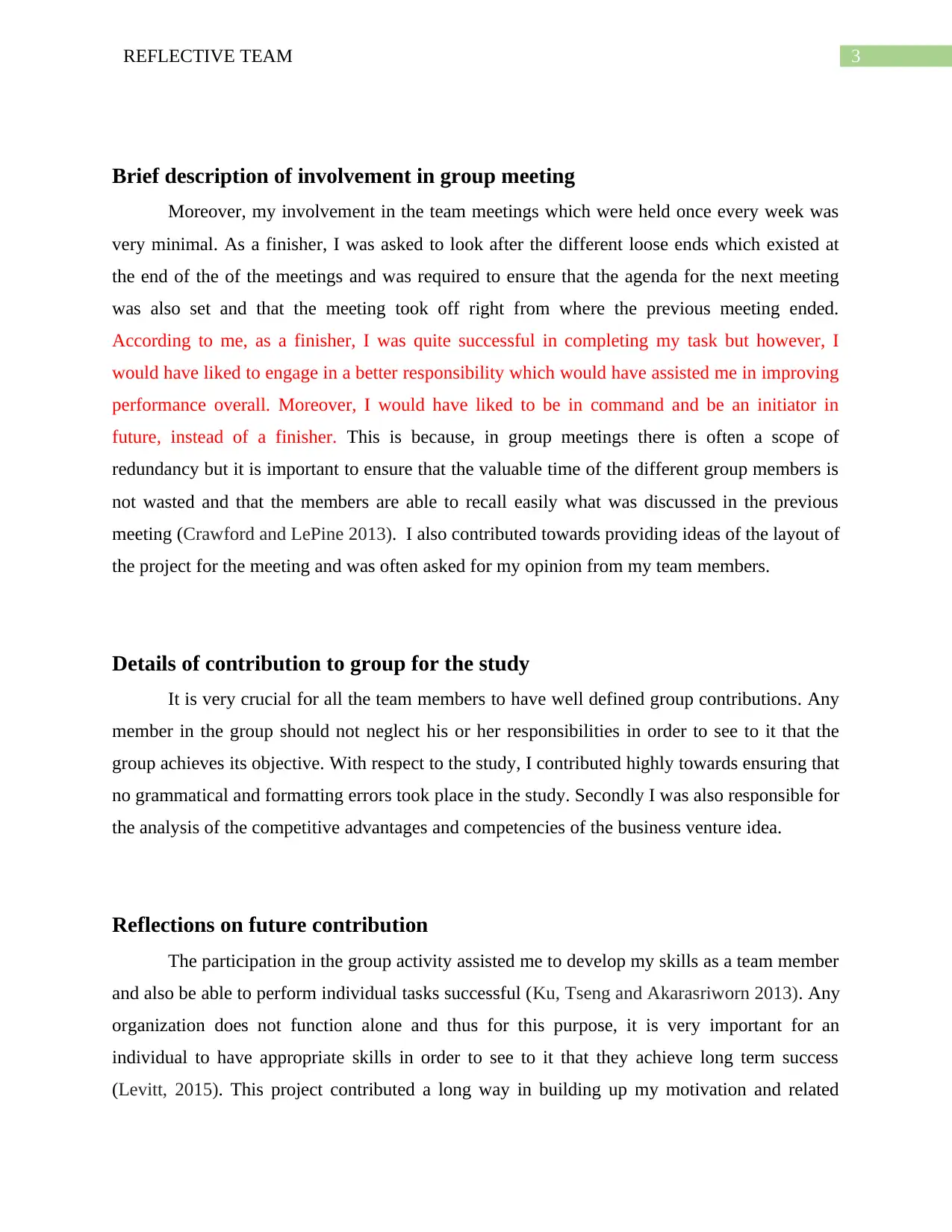
3REFLECTIVE TEAM
Brief description of involvement in group meeting
Moreover, my involvement in the team meetings which were held once every week was
very minimal. As a finisher, I was asked to look after the different loose ends which existed at
the end of the of the meetings and was required to ensure that the agenda for the next meeting
was also set and that the meeting took off right from where the previous meeting ended.
According to me, as a finisher, I was quite successful in completing my task but however, I
would have liked to engage in a better responsibility which would have assisted me in improving
performance overall. Moreover, I would have liked to be in command and be an initiator in
future, instead of a finisher. This is because, in group meetings there is often a scope of
redundancy but it is important to ensure that the valuable time of the different group members is
not wasted and that the members are able to recall easily what was discussed in the previous
meeting (Crawford and LePine 2013). I also contributed towards providing ideas of the layout of
the project for the meeting and was often asked for my opinion from my team members.
Details of contribution to group for the study
It is very crucial for all the team members to have well defined group contributions. Any
member in the group should not neglect his or her responsibilities in order to see to it that the
group achieves its objective. With respect to the study, I contributed highly towards ensuring that
no grammatical and formatting errors took place in the study. Secondly I was also responsible for
the analysis of the competitive advantages and competencies of the business venture idea.
Reflections on future contribution
The participation in the group activity assisted me to develop my skills as a team member
and also be able to perform individual tasks successful (Ku, Tseng and Akarasriworn 2013). Any
organization does not function alone and thus for this purpose, it is very important for an
individual to have appropriate skills in order to see to it that they achieve long term success
(Levitt, 2015). This project contributed a long way in building up my motivation and related
Brief description of involvement in group meeting
Moreover, my involvement in the team meetings which were held once every week was
very minimal. As a finisher, I was asked to look after the different loose ends which existed at
the end of the of the meetings and was required to ensure that the agenda for the next meeting
was also set and that the meeting took off right from where the previous meeting ended.
According to me, as a finisher, I was quite successful in completing my task but however, I
would have liked to engage in a better responsibility which would have assisted me in improving
performance overall. Moreover, I would have liked to be in command and be an initiator in
future, instead of a finisher. This is because, in group meetings there is often a scope of
redundancy but it is important to ensure that the valuable time of the different group members is
not wasted and that the members are able to recall easily what was discussed in the previous
meeting (Crawford and LePine 2013). I also contributed towards providing ideas of the layout of
the project for the meeting and was often asked for my opinion from my team members.
Details of contribution to group for the study
It is very crucial for all the team members to have well defined group contributions. Any
member in the group should not neglect his or her responsibilities in order to see to it that the
group achieves its objective. With respect to the study, I contributed highly towards ensuring that
no grammatical and formatting errors took place in the study. Secondly I was also responsible for
the analysis of the competitive advantages and competencies of the business venture idea.
Reflections on future contribution
The participation in the group activity assisted me to develop my skills as a team member
and also be able to perform individual tasks successful (Ku, Tseng and Akarasriworn 2013). Any
organization does not function alone and thus for this purpose, it is very important for an
individual to have appropriate skills in order to see to it that they achieve long term success
(Levitt, 2015). This project contributed a long way in building up my motivation and related
Paraphrase This Document
Need a fresh take? Get an instant paraphrase of this document with our AI Paraphraser
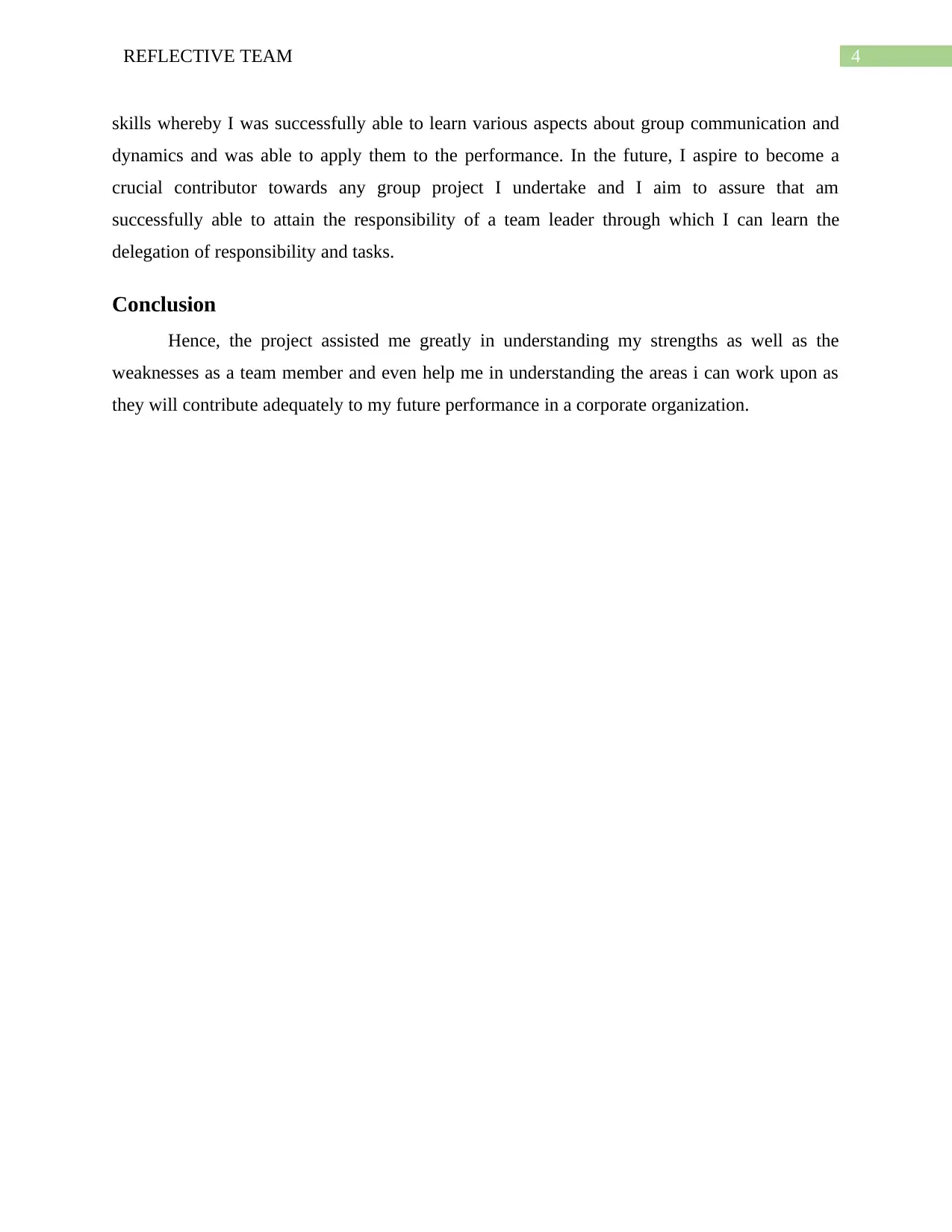
4REFLECTIVE TEAM
skills whereby I was successfully able to learn various aspects about group communication and
dynamics and was able to apply them to the performance. In the future, I aspire to become a
crucial contributor towards any group project I undertake and I aim to assure that am
successfully able to attain the responsibility of a team leader through which I can learn the
delegation of responsibility and tasks.
Conclusion
Hence, the project assisted me greatly in understanding my strengths as well as the
weaknesses as a team member and even help me in understanding the areas i can work upon as
they will contribute adequately to my future performance in a corporate organization.
skills whereby I was successfully able to learn various aspects about group communication and
dynamics and was able to apply them to the performance. In the future, I aspire to become a
crucial contributor towards any group project I undertake and I aim to assure that am
successfully able to attain the responsibility of a team leader through which I can learn the
delegation of responsibility and tasks.
Conclusion
Hence, the project assisted me greatly in understanding my strengths as well as the
weaknesses as a team member and even help me in understanding the areas i can work upon as
they will contribute adequately to my future performance in a corporate organization.
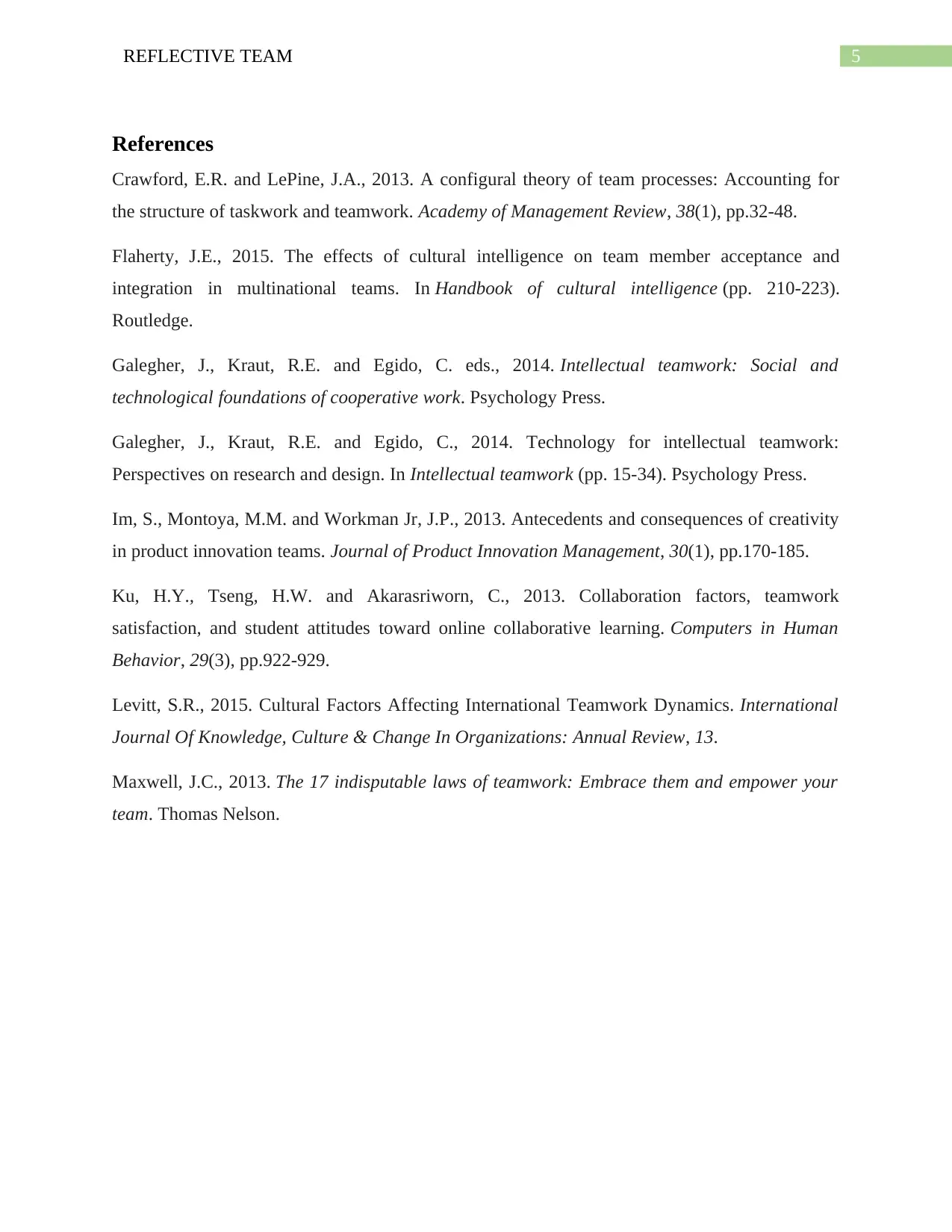
5REFLECTIVE TEAM
References
Crawford, E.R. and LePine, J.A., 2013. A configural theory of team processes: Accounting for
the structure of taskwork and teamwork. Academy of Management Review, 38(1), pp.32-48.
Flaherty, J.E., 2015. The effects of cultural intelligence on team member acceptance and
integration in multinational teams. In Handbook of cultural intelligence (pp. 210-223).
Routledge.
Galegher, J., Kraut, R.E. and Egido, C. eds., 2014. Intellectual teamwork: Social and
technological foundations of cooperative work. Psychology Press.
Galegher, J., Kraut, R.E. and Egido, C., 2014. Technology for intellectual teamwork:
Perspectives on research and design. In Intellectual teamwork (pp. 15-34). Psychology Press.
Im, S., Montoya, M.M. and Workman Jr, J.P., 2013. Antecedents and consequences of creativity
in product innovation teams. Journal of Product Innovation Management, 30(1), pp.170-185.
Ku, H.Y., Tseng, H.W. and Akarasriworn, C., 2013. Collaboration factors, teamwork
satisfaction, and student attitudes toward online collaborative learning. Computers in Human
Behavior, 29(3), pp.922-929.
Levitt, S.R., 2015. Cultural Factors Affecting International Teamwork Dynamics. International
Journal Of Knowledge, Culture & Change In Organizations: Annual Review, 13.
Maxwell, J.C., 2013. The 17 indisputable laws of teamwork: Embrace them and empower your
team. Thomas Nelson.
References
Crawford, E.R. and LePine, J.A., 2013. A configural theory of team processes: Accounting for
the structure of taskwork and teamwork. Academy of Management Review, 38(1), pp.32-48.
Flaherty, J.E., 2015. The effects of cultural intelligence on team member acceptance and
integration in multinational teams. In Handbook of cultural intelligence (pp. 210-223).
Routledge.
Galegher, J., Kraut, R.E. and Egido, C. eds., 2014. Intellectual teamwork: Social and
technological foundations of cooperative work. Psychology Press.
Galegher, J., Kraut, R.E. and Egido, C., 2014. Technology for intellectual teamwork:
Perspectives on research and design. In Intellectual teamwork (pp. 15-34). Psychology Press.
Im, S., Montoya, M.M. and Workman Jr, J.P., 2013. Antecedents and consequences of creativity
in product innovation teams. Journal of Product Innovation Management, 30(1), pp.170-185.
Ku, H.Y., Tseng, H.W. and Akarasriworn, C., 2013. Collaboration factors, teamwork
satisfaction, and student attitudes toward online collaborative learning. Computers in Human
Behavior, 29(3), pp.922-929.
Levitt, S.R., 2015. Cultural Factors Affecting International Teamwork Dynamics. International
Journal Of Knowledge, Culture & Change In Organizations: Annual Review, 13.
Maxwell, J.C., 2013. The 17 indisputable laws of teamwork: Embrace them and empower your
team. Thomas Nelson.
⊘ This is a preview!⊘
Do you want full access?
Subscribe today to unlock all pages.

Trusted by 1+ million students worldwide
1 out of 6
Related Documents
Your All-in-One AI-Powered Toolkit for Academic Success.
+13062052269
info@desklib.com
Available 24*7 on WhatsApp / Email
![[object Object]](/_next/static/media/star-bottom.7253800d.svg)
Unlock your academic potential
Copyright © 2020–2026 A2Z Services. All Rights Reserved. Developed and managed by ZUCOL.





